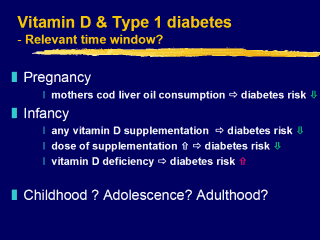| front |1 |2 |3 |4 |5 |6 |7 |8 |9 |10 |11 |12 |13 |14 |review |
 |
Most studies
have concentrated on investigating the effect of vitamin D exposure in infancy. Although
infancy is thought to be potentially a crucial period for the development of type 1
diabetes, studies have focused on this stage of life mostly because vitamin D intake of
the infant is (relatively) easily measurable. Results have been relatively consistent. In a Norwegian study, motherís cod liver oil consumption during pregnancy was observed to be associated with a reduced risk of type 1 diabetes in the offspring. In another case-control study, carried out in 7 European countries, diabetes risk was found to be reduced by 30% if the child had received vitamin D supplementation. In the Northern Finland 1966 Cohort study, we found also an association between vitamin D and reduced diabetes risk , and I will talk about this study in more detail next. To my knowledge, there is practically no published data on the effect of vitamin D intake or status after infancy, before the onset of the disease. |